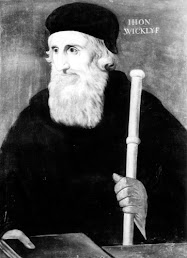In honor of tomorrow's anniversary of John Wycliffe's death (December 31, 1384), here is a timeline and history of him, his context, and his followers.
1303 - Pope Boniface VIII issued Unam Sanctam, which asserted his authority over the state and claimed “Now, therefore, we declare, say, determine and pronounce that for every human creature it is necessary for salvation to be subject to the authority of the Roman pontiff.” He was then arrested by French troops and died shortly after.
1305-1376 - “The Babylonian captivity of the papacy,” in which the papacy was moved to France, under the watchful eye of the French king.
1327 - Edward III begins his fifty-year reign as King of England.
c. 1330 - John Wycliffe was born.
1337 - The Hundred Years War between England and France begins (this led to a greater emphasis on English identity and language and increased tension with the pope who was in France).
1344 - Thomas Bradwardine, a chaplain to the king, wrote The Cause of God against the Pelagians, a work teaching God’s sovereignty, predestination, and grace that would influence Wycliff.
1346-1353 - The black plague struck Europe, killing about 1/3 of the population (about 25 million people).
1372 - John Wycliffe received his doctorate in theology from Oxford University.
1374-1377 - John Wycliffe began to publish his writings on government and the reform of the church.
1377 - Pope Gregory XI denounced some of Wycliffe’s teachings, but King Edward III died and Wycliffe was protected by supports like John of Gaunt. Pope Gregory XI died the next year. The new English king, Richard II, was only ten years old. Around the same time, William Langland wrote Piers Plowman.
1378-1417 - The Western Schism, in which more than one person claimed to be pope.
1380 - John Wycliffe began to teach against the doctrine of transubstantiation, arguing that Christ is present in the Lord’s Supper in a spiritual and sacramental manner. His support among the nobility began to decline. He also increasingly argued for Scripture as the supreme authority over the church and against the legitimacy of the papacy. He began overseeing a translation of the Bible into English and he trained priests to go out and preach to the people.
1381 - The Peasants’ Revolt. Wycliffe denounced the revolt, but some blamed him for it.
1382 - Anne of Bohemia married Richard II of England, connecting the two countries. Wycliffe’s writings would thus be carried to Bohemia and promoted by Jan Hus a couple decades later.
1384 - John Wycliffe suffered a stroke while leading worship and died soon after on December 31st.
1387 - Geoffrey Chaucer began writing The Canterbury Tales.
1388 - The translation of the Bible overseen by Wycliffe was revised and released by John Purvey.
1428 - As he had been declared a heretic in 1415, Wycliffe’s corpse was unburied and burned.
Those who agreed with Wycliff and carried on his legacy in England were known as Lollards. For a time, despite persecution, Lollards included some men of influence, such as some Oxford scholars and a group of knights during the reign of Richard II (1377-1399). This group of knights submitted “The Twelve Conclusions” (1395) to Parliament, expressing Lollard hopes for reform. In addition, they stressed the importance of preaching and access to Scripture in English.
In 1401, John Purvey, a priest and Wycliff’s assistant, was forced to recant (although he preached Lollard teachings afterwards and later died in prison) and William Sawtry, a priest, was burned for such “heresies” as denying transubstantiation. In 1414, Sir John Oldcastle, who had been imprisoned for Lollard beliefs and has escaped, led an uprising, which failed. After this, Lollards found less support among higher ranks and survived more among craftsmen, merchants, and other commoners.
Throughout the 1400s, Lollards continued to operate, occasionally being prosecuted. Books of the Bible and tracts were copied and circulated. Preachers traveled with these ideas. Their ideas circulated among the people. From 1455-1487, the War of the Roses engulfed England. King Richard III owned a Lollard translation of the Bible. Around 1490, the Lollards and their persecution began to grow again. In the 1520s, the Lollards welcomed and helped spread the writings of the Reformers like William Tyndale, merging with the Protestant Reformation.








